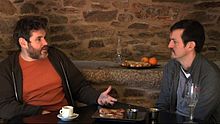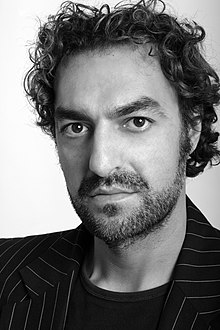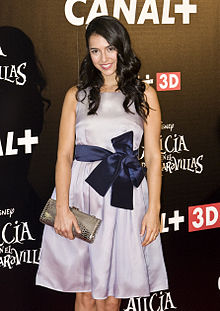18 comidas - 18 meals
18 Comidas - 18 meals with the original title 18 comidas is a film by the Galician director Jorge Coira from 2010 that has been declared a drama / comedy . Around the three meals of breakfast, lunch and dinner, six to twelve narrative threads are included, depending on how they are counted portrayed by 18 main characters at different locations in the Galician city of Santiago de Compostela . These run parallel at the beginning of the film, are told episodically and are partly brought together in the course of the film. The best-known actors in the cast include a. Luis Tosar ( Cell 211 - The Prison Rebellion ), Fede Pérez ( The Sea Inside Me ), Juan Carlos Vellido ( Pirates of the Caribbean - On Stranger Tides ), Cristina Brondo ( Alice in Wonderland ) and Xosé Manuel Olveira (The Sea Inside Me, cell 211 - The prison riot, La lengua de las mariposas ). The film opened in German cinemas on December 6, 2012.
action
The film is divided into three parts: desayuno (Spanish for breakfast), comida (Spanish for lunch) and cena (Spanish for dinner) and depicts a complete fictional day.
The street musician Edu, contrary to expectations, meets his eternal crush Sol, who, despite his child and husband (Teo), invites him to their home for a meal together. The Macedonian Spasek, driven from his homeland by the loss of his long-time girlfriend, got lost in Santiago de Compostela. Vladimir Torres prepares breakfast, lunch and dinner throughout the film, hoping for a certain Laura to appear. Two friends (Fran and Tuto) experience the day after a long night of partying and meet Vladimir for breakfast at his home. Vladimir's cousin Lucas, who has spent the night with Nuria, joins them later. He makes hopes with her, but Nuria is actually in a relationship with the older Víctor, who does not give her what she desires in his heart. The businessman Juan meets the waitress Ana over coffee and a croissant in a bar in the morning, and he takes her to dinner with his brother Víctor. Sergio and Sergio, who is pretended to be a roommate, receive them for dinner, which leads to disputes between the brothers. The siblings Rosana and Mar also quarrel because Rosana dreams of singing in a chapel and may therefore leave the restaurant they run together. There are also disagreements between the leaders of the chapel, José and his son (NAME); they disagree about the musical direction of the ensemble. Later, together with Rosana, the two experience a nice and then a very unpleasant surprise. Unimpressed by world events, an older, silent couple quietly eats all three meals.
production
The production of the film was taken care of by the production companies Tic Tac Producciones, ZircoZine and Lagarto Cine. Lead producers were Hugo Castro, Fernanda del Nido, Luis Tosar and José Nolla. The film was produced with a budget of € 267,861. The film acquires truth and credibility through the peculiarity of the script or the drama. This is because the actors were not given any dialogues or instructions. Instead, the actors and the director developed the goals and traits of their characters, knew what conflicts their characters would face and when they would meet other characters. The rest was freely improvised. It went so far that the director Jorge Coira gave instructions to the actors via SMS during the shoot. A total of 90 hours of raw film material was filmed simultaneously with four cameras on nine days of shooting. It took the director eight months from the start of editing to the completion of the film.
criticism
On Film Affinity España, 4457 people (as of December 23, 2016) voted on the quality of the film. It reaches 6.4 points on a ten scale. On imdb.com, the film received a weighted rating of 6.5 out of 10 points from 410 votes (as of December 23, 2016).
Trade magazines and newspapers such as El País , The Hollywood Reporter and El Financiero rated the film positively.
Awards
Taormina International Film Festival (Italy) 2010
- Best Director Award for Jorge Coira
OUFF Ourense International Film Festival (Spain) 2010
- Audience Award
- Special jury award
Festival CineEsCena / La Laguna International Film Festival (Spain) 2011
- Best Picture Award
- Audience Award
Biennale du cinéma espagnol Annecy (France) 2012
- Audience award
Douro Film Harvest (Portugal) 2013
- Best Picture Award (Food Films)
Mestre Mateo Awards (Academia do Audiovisual Galego) (Galicia) 2010
- Mestre Mateo Award in the Best Film category for Jorge Coira
- Mestre Mateo Award in the Best Director category for Jorge Coira
- Mestre Mateo Award in the Best Editing category for Jorge Coira
- Mestre Mateo Award for Best Screenplay for Jorge Coira, Araceli Gonda & Diego Ameixeiras
- Mestre Mateo Award in the Best Original Music category for Piti Sanz & Iván Laxe
- Mestre Mateo Award in the Best Production Management category for María Liaño
- Mestre Mateo Award in the Best Sound category for Carlos Mouriño, Diego S. Staub & Carlos García
Screenings at festivals
The film was shown at more than 30 festivals in u. a. France , Mexico , Colombia , Italy , Finland , Portugal , Russia , United States of America , Serbia , Macedonia , England , Ireland , Australia and New Zealand . Incomplete list:
- Taormina International Film Festival
- Guadalajara International Film Festival
- Cartagena International Film Festival
- La Laguna International Gastronomic Film Festival
- Skopje Film Festival
- Festival Belgrade
- London Spanish Film Festival
- Chicago Latino Film Festival
- Ourense International Film Festival
- Festroia
- Dífferent 4! Paris
- Films by the Sea
- Lima International Film Festival
- Hawaii International Film Festival
- Cinespaña
- Cork International Film Festival
- Biennale du cinéma espagnol Annecy
- Semaine du cinéma hispanique de Clermont-Ferrand
- Festival Du Douarnenez
- Helsinki International Film Festival
Web links
- 18 Comidas - 18 meals in the Internet Movie Database (English)
- Facebook page for the film
- The director about his film , accessed on December 22, 2016
- Film Affinity España on the film , accessed December 22, 2016
- Filmstarts.de about the film , accessed on December 22, 2016
- Mujer hoy on the making of the film , accessed on December 23, 2016
Individual evidence
- ↑ a b Info about the film. Two thousand and one, accessed December 22, 2016 .
- ↑ FSK on the film , accessed on December 22, 2016
- ↑ Info about the film. Culturagalega.org, accessed December 23, 2016 .
- ↑ Info about the film. Europapress, accessed December 23, 2016 .
- ↑ a b Info about the film. Jorge Coira, accessed December 23, 2016 .
- ↑ Info about the film. Film Affinity España, accessed December 23, 2016 .
- ↑ imdb.com rating of the film , accessed on December 23, 2016
- ↑ El Pais , accessed December 23, 2016
- ↑ The Hollywood Reporter , accessed December 23, 2016
- ^ El Financiero , accessed December 23, 2016
- ^ Website of the Biennale d'Annecy ( Memento of January 24, 2016 in the Internet Archive ), accessed on December 22, 2016
- ^ Website of the Douro Film Harvest Festival , accessed December 22, 2016
- ↑ Winner of the Mestre Mateo Awards 2010 , pdf, accessed on December 22, 2016
- ↑ Cinema Republic, distribution about the film, accessed December 23, 2016



